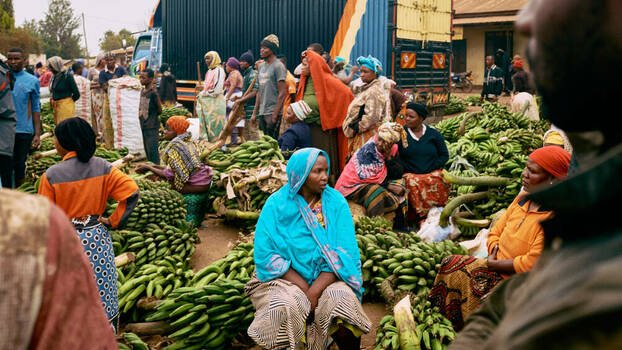
African food systems are imploding under the weight of rising food prices caused by the war in Ukraine and its effects on trade, commodity prices, and financial markets. African countries are feeling the reverberating effects of the war through three main channels, namely higher food prices due to higher commodity prices and speculation, Africa’s import dependency in the context of opaque private grain stockpiling and inadequate public food reserves, and rising fertilizer prices against the backdrop of a fossil-fuel based model of agriculture.
Refiloe Joala is the Food Sovereignty programme manager in the Rosa Luxemburg Foundation’s Southern Africa Regional Office in Johannesburg, South Africa. She is particularly interested in the nature and outcomes of changing agrofood systems within the context of growing corporate control in Southern Africa, and also works on seed sovereignty and farmworkers’ rights in the region.
Jan Urhahn coordinates the Rosa Luxemburg Foundation’s Food Sovereignty Programme in Johannesburg, South Africa. He mainly works on topics such as farmworkers’ rights, the impacts of hazardous pesticides, seed ownership, and Green Revolution approaches versus viable alternatives such as agroecology.
According to UNCTAD, 25 African countries depended on Russia and Ukraine for at least 30 percent of their wheat, while 16 out of these 25 countries sourced 50 percent of their wheat from Russia and Ukraine. Russia supplies the world with 12.7 percent of its phosphate and 15.5 percent of its nitrogen in the form of urea. More than 30 African countries import nitrogenous, potassium, and phosphate fertilizers from Russia and Belarus.
Breaking Path Dependency
The war in Ukraine has further highlighted the fragility of Africa’s increasingly corporatized food systems, which were laid bare during the COVID-19 pandemic. In Southern and Eastern Africa, for instance, maize-based food systems characterized by input-intensive farming systems have resulted in heavy reliance on food imports in order to ensure food security, making these African countries particularly vulnerable to external food price shocks.
On top of the pandemic-induced hunger crisis on the African continent and converging climate crises, high food price inflation makes poor people even poorer. In Africa, the poverty rate rose to 39 percent during the COVID-19 pandemic. African governments are mobilizing resources to buffer the most vulnerable groups against the soaring living costs, but in the short to medium term, structural policies are needed to address the inherent vulnerability of current food systems and find pathways towards more resilient and sustainable food systems.
On the occasion of the fiftieth session of the Committee on World Food Security (CFS), set to take place from 10–13 October 2022 in Rome, the Rosa Luxemburg Foundation’s Regional Office for Southern Africa and the UN Office in Geneva have published a report on state of African agrofood systems in the face of the current global food price crisis, making it clear that a more reflective and transformative policy discourse is needed. The CFS must lead the charge in turning the tide and handing food systems back to farming and fishing communities, food workers, and consumer groups.
Recommendations for short-term interventions:
- Debt relief and debt cancellation for heavily indebted and food-importing countries
- Strengthening social protection systems and subsidies
- Building national and regional food reserves
Recommendations for medium-term interventions including structural responses:
- Extending and diversifying staple food production to strengthen sub-national and national food supply chains
- Regulating food prices and introducing price caps for staple foods as well as curbing speculation with food
- Reduce dependence on fossil fuel-based inputs by phasing out agricultural support that focuses on the supply of agrochemicals and commercial seeds that promote monocrop production